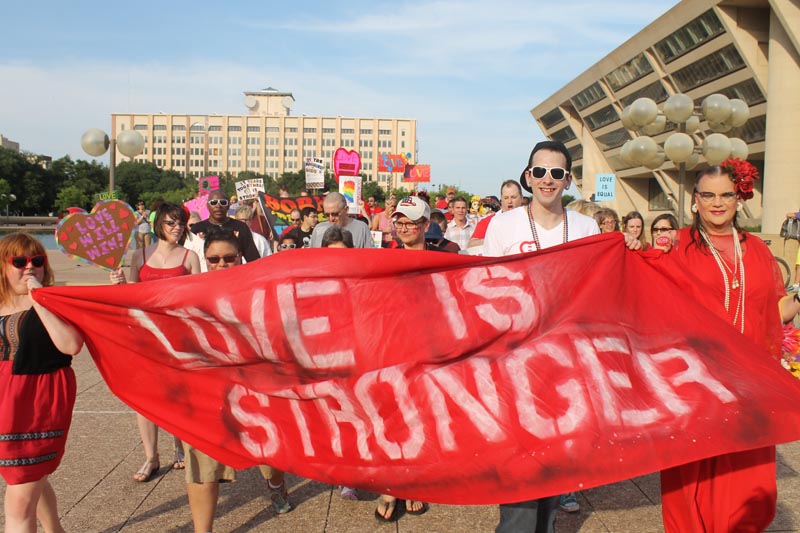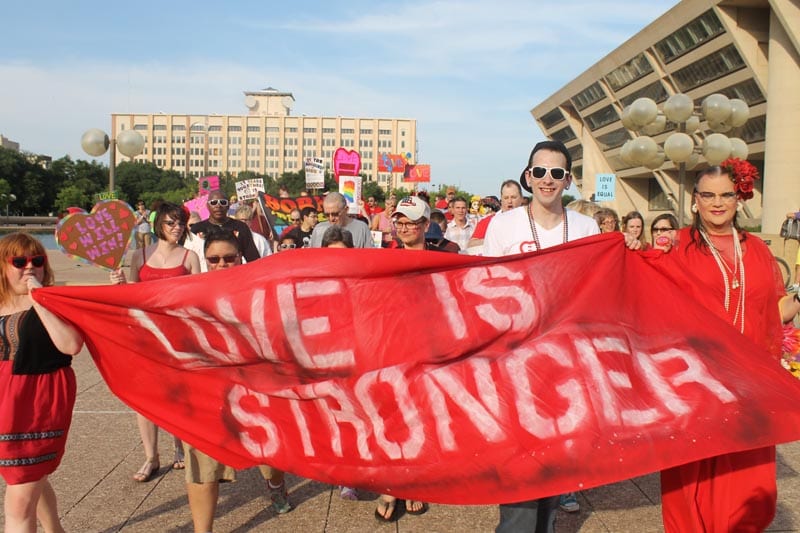
Dallas LGBT advocates march for marriage equality in a Love is Stronger rally on June 8, 2013. (David Taffet/ Dallas Voice)
The U.S. Supreme Court will issue rulings Wednesday in two marriage equality cases, California’s Proposition 8 and the Defense of Marriage Act.
Chief Justice John Roberts announced after three rulings Tuesday morning that the court would meet for its final day Wednesday at 9 a.m. CST to read its last three decisions. Wednesday is the 10th anniversary of when the court ruled that sodomy laws nationwide were unconstitutional in Lawrence v. Texas.
Dallas’ LGBT community and allies will celebrate the marriage rulings at a Day of Decision rally Wednesday night at 7 p.m. at the Legacy of Love monument.
Roberts read the court’s ruling Tuesday in the Voting Rights Act case, Shelby County v. Holder, striking down a central part of the act, which LGBT advocates say is a step backwards in eliminating discrimination at the polls. The decision reduces the federal government’s role in overseeing voting laws in areas with a history of racial discrimination.
“These varied and powerful voices attest to the self-evident reality that racial protections are still needed in voting in this country. As recently as last year’s elections, political partisans resorted to voter suppression laws and tactics aimed at reducing the votes of people of color,” read a joint statement from numerous LGBT groups, including the Human Rights Campaign and Lambda Legal.
“Voting rights protections, which have long served our nation’s commitment to equality and justice, should not be cast aside now. The court has done America a grave disservice, and we will work with our coalition partners to undo the damage inflicted by this retrogressive ruling.”
As for the marriage cases, justices are expected to rule narrowly. In Hollingsworth v. Perry’s challenge of California’s constitutional marriage amendment, the ruling could just affect that state, greatly increasing the number of the country’s population that lives in marriage-equality states. Most legal experts don’t expect the court to strike Prop 8 and find all marriage amendments unconstitutional in the 37 states that have such bans, as it did with sodomy laws in Lawrence.
One of the interesting facets of the court releasing its decision in two marriage equality cases on the Lawrence anniversary is that anti-gay Justice Antonin Scalia predicted that case would lead to same-sex marriage in his dissenting opinion in 2003.
“State laws against bigamy, same-sex marriage, adult incest, prostitution, masturbation, adultery, fornication, bestiality, and obscenity are likewise sustainable only in light of Bowers’ validation of laws based on moral choices,” Scalia wrote. “Every single one of these laws is called into question by today’s decision; the Court makes no effort to cabin the scope of its decision to exclude them from its holding.
“Today’s opinion dismantles the structure of constitutional law that has permitted a distinction to be made between heterosexual and homosexual unions, insofar as formal recognition in marriage is concerned. If moral disapprobation of homosexual conduct is ‘no legitimate state interest’ for purposes of proscribing that conduct … what justification could there possibly be for denying the benefits of marriage to homosexual couples exercising ‘(t)he liberty protected by the Constitution’?”
In the DOMA case, U.S. v. Windsor, the court is expected to find DOMA unconstitutional, which would require the federal government to recognize same-sex marriage. But the decision could hinge on states and give federal recognition for marriage benefits to same-sex couples living in marriage-equality states.
Or the court could hold off on issuing its decisions until its next term that starts in September.
No law exists that requires the court to release decisions in the same term the cases are heard. It did so with Brown v. Board of Education and Roe v. Wade. With rulings in both cases expected to be the most important in LGBT history, some expect at least one decision to be released Wednesday, especially since two of the last three decisions are about same-sex marriage. But only time will tell.











